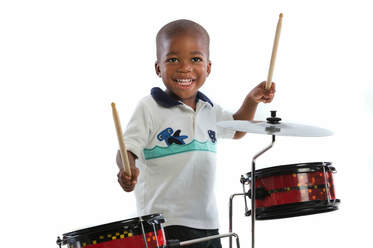
Music affects our mind, body and spirit, but yet the importance of music lessons is often underrated. With the ability to influence our behaviour, social skills like emotional intelligence, sensitivity and general achievement, music can have positive effects on many aspects of life.
In children, music education is important as it promotes a desire to persevere and succeed, as well as having a whole range of other benefits.
Some academic evidence suggests that through involvement with music, children learn to fine-tune their listening skills and consequently their comprehension. Both skills can be applied to other academic subjects and can help students with problem solving and concentration. Music uses both sides of the brain, so any participation will enhance learning and challenge the mind.
Apart from the mental benefits, music has many positive physical effects. By playing an instrument e.g. piano, violin or drums the musician is encouraged to develop fine motor skills and excellent hand-eye coordination as well as the ability to be precise. Vocalists require a level of exertion of the diaphragm which can help vital organs to work as they should, while muscles can be strengthened too.
Music is flexible and versatile. It can teach people the importance of working as an individual or as part of a team, encouraging social interaction e.g. being part of a school band, choir, chamber music group etc. which is an important life skill and one which translates well to the workplace.
Those who play instruments typically dedicate time to practice and developing their creativity as well as organisational skills and perseverance. Those involved in choirs, bands and orchestras learn the importance of playing their part in a bigger project and also realise the need for time management, being reliable and switched on.
Of course not everyone is academic and music can be an outlet for many emotions including contentment, frustration, anger, joy and fulfilment. By expressing oneself through the music, a sense of self-esteem is developed and a degree of self-belief fostered, especially in those who may struggle socially or academically. Many pop artists like Adele and Beyoncé refer their solitude and frustration to be the driving engine behind their hit songs.
Therefore it is an obligation of parents, schools, artists and concert venues to enable an open dialog between children and different genres of music to make music a fundamental human value.
In children, music education is important as it promotes a desire to persevere and succeed, as well as having a whole range of other benefits.
Some academic evidence suggests that through involvement with music, children learn to fine-tune their listening skills and consequently their comprehension. Both skills can be applied to other academic subjects and can help students with problem solving and concentration. Music uses both sides of the brain, so any participation will enhance learning and challenge the mind.
Apart from the mental benefits, music has many positive physical effects. By playing an instrument e.g. piano, violin or drums the musician is encouraged to develop fine motor skills and excellent hand-eye coordination as well as the ability to be precise. Vocalists require a level of exertion of the diaphragm which can help vital organs to work as they should, while muscles can be strengthened too.
Music is flexible and versatile. It can teach people the importance of working as an individual or as part of a team, encouraging social interaction e.g. being part of a school band, choir, chamber music group etc. which is an important life skill and one which translates well to the workplace.
Those who play instruments typically dedicate time to practice and developing their creativity as well as organisational skills and perseverance. Those involved in choirs, bands and orchestras learn the importance of playing their part in a bigger project and also realise the need for time management, being reliable and switched on.
Of course not everyone is academic and music can be an outlet for many emotions including contentment, frustration, anger, joy and fulfilment. By expressing oneself through the music, a sense of self-esteem is developed and a degree of self-belief fostered, especially in those who may struggle socially or academically. Many pop artists like Adele and Beyoncé refer their solitude and frustration to be the driving engine behind their hit songs.
Therefore it is an obligation of parents, schools, artists and concert venues to enable an open dialog between children and different genres of music to make music a fundamental human value.
 RSS Feed
RSS Feed